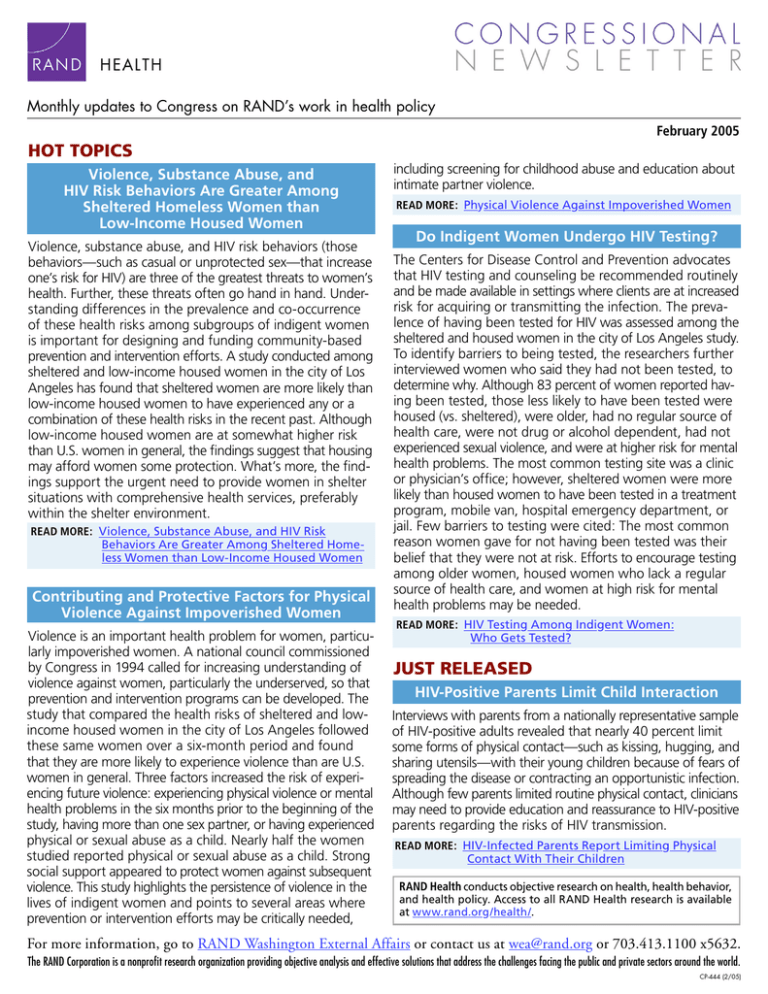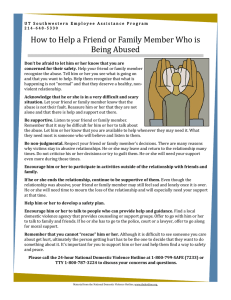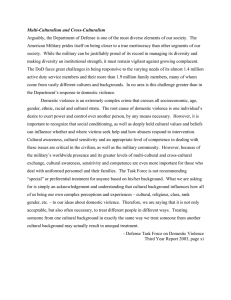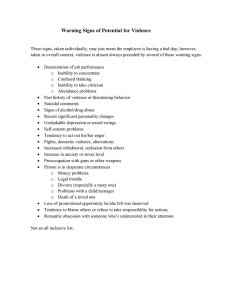
Monthly updates to Congress on RAND’s work in health policy
February 2005
HOT TOPICS
Violence, Substance Abuse, and
HIV Risk Behaviors Are Greater Among
Sheltered Homeless Women than
Low-Income Housed Women
Violence, substance abuse, and HIV risk behaviors (those
behaviors—such as casual or unprotected sex—that increase
one’s risk for HIV) are three of the greatest threats to women’s
health. Further, these threats often go hand in hand. Understanding differences in the prevalence and co-occurrence
of these health risks among subgroups of indigent women
is important for designing and funding community-based
prevention and intervention efforts. A study conducted among
sheltered and low-income housed women in the city of Los
Angeles has found that sheltered women are more likely than
low-income housed women to have experienced any or a
combination of these health risks in the recent past. Although
low-income housed women are at somewhat higher risk
than U.S. women in general, the findings suggest that housing
may afford women some protection. What’s more, the findings support the urgent need to provide women in shelter
situations with comprehensive health services, preferably
within the shelter environment.
READ MORE: Violence, Substance Abuse, and HIV Risk
Behaviors Are Greater Among Sheltered Homeless Women than Low-Income Housed Women
Contributing and Protective Factors for Physical
Violence Against Impoverished Women
Violence is an important health problem for women, particularly impoverished women. A national council commissioned
by Congress in 1994 called for increasing understanding of
violence against women, particularly the underserved, so that
prevention and intervention programs can be developed. The
study that compared the health risks of sheltered and lowincome housed women in the city of Los Angeles followed
these same women over a six-month period and found
that they are more likely to experience violence than are U.S.
women in general. Three factors increased the risk of experiencing future violence: experiencing physical violence or mental
health problems in the six months prior to the beginning of the
study, having more than one sex partner, or having experienced
physical or sexual abuse as a child. Nearly half the women
studied reported physical or sexual abuse as a child. Strong
social support appeared to protect women against subsequent
violence. This study highlights the persistence of violence in the
lives of indigent women and points to several areas where
prevention or intervention efforts may be critically needed,
including screening for childhood abuse and education about
intimate partner violence.
READ MORE: Physical Violence Against Impoverished Women
Do Indigent Women Undergo HIV Testing?
The Centers for Disease Control and Prevention advocates
that HIV testing and counseling be recommended routinely
and be made available in settings where clients are at increased
risk for acquiring or transmitting the infection. The prevalence of having been tested for HIV was assessed among the
sheltered and housed women in the city of Los Angeles study.
To identify barriers to being tested, the researchers further
interviewed women who said they had not been tested, to
determine why. Although 83 percent of women reported having been tested, those less likely to have been tested were
housed (vs. sheltered), were older, had no regular source of
health care, were not drug or alcohol dependent, had not
experienced sexual violence, and were at higher risk for mental
health problems. The most common testing site was a clinic
or physician’s office; however, sheltered women were more
likely than housed women to have been tested in a treatment
program, mobile van, hospital emergency department, or
jail. Few barriers to testing were cited: The most common
reason women gave for not having been tested was their
belief that they were not at risk. Efforts to encourage testing
among older women, housed women who lack a regular
source of health care, and women at high risk for mental
health problems may be needed.
READ MORE: HIV Testing Among Indigent Women:
Who Gets Tested?
JUST RELEASED
HIV-Positive Parents Limit Child Interaction
Interviews with parents from a nationally representative sample
of HIV-positive adults revealed that nearly 40 percent limit
some forms of physical contact—such as kissing, hugging, and
sharing utensils—with their young children because of fears of
spreading the disease or contracting an opportunistic infection.
Although few parents limited routine physical contact, clinicians
may need to provide education and reassurance to HIV-positive
parents regarding the risks of HIV transmission.
READ MORE: HIV-Infected Parents Report Limiting Physical
Contact With Their Children
RAND Health conducts objective research on health, health behavior,
and health policy. Access to all RAND Health research is available
at www.rand.org/health/.
For more information, go to RAND Washington External Affairs or contact us at wea@rand.org or 703.413.1100 x5632.
The RAND Corporation is a nonprofit research organization providing objective analysis and effective solutions that address the challenges facing the public and private sectors around the world.
CP-444 (2/05)






